 |
|---|
This article lists political parties in Sierra Leone. Sierra Leone has a multi-party system, with two or three strong political parties and a third party that is electorally successful.
 |
|---|
This article lists political parties in Sierra Leone. Sierra Leone has a multi-party system, with two or three strong political parties and a third party that is electorally successful.
| Party | Abbr. | Leader | Political position | Ideology | MPs | |
|---|---|---|---|---|---|---|
| Sierra Leone People's Party | SLPP | Julius Maada Bio | Centre to centre-left | Social democracy Civic nationalism Third Way | 81 / 149 | |
| All People's Congress | APC | Ernest Bai Koroma | Centre-left | African nationalism Pan-Africanism | 54 / 149 | |
The largest contest within Sierra Leone's political culture centres upon the competition between the ethnic Temne in Sierra Leone's north-west, and the Mende in Sierra Leone's south-east. [1]
The vast majority of the Mende support the Sierra Leone People's Party (SLPP). The majority of the Temne support the All People's Congress (APC). [2]

Sierra Leone, officially the Republic of Sierra Leone, is a country on the southwest coast of West Africa. It shares its southeastern border with Liberia and is bordered by Guinea to the north. With a land area of 71,740 km2 (27,699 sq mi), Sierra Leone has a tropical climate and with a variety of environments ranging from savannas to rainforests. According to the 2015 census, Sierra Leone has a population of 7,092,113, with Freetown serving as both the capital and largest city. The country is divided into five administrative regions, which are further subdivided into 16 districts.
Sierra Leone first became inhabited by indigenous African peoples at least 2,500 years ago. The Limba were the first tribe known to inhabit Sierra Leone. The dense tropical rainforest partially isolated the region from other West African cultures, and it became a refuge for peoples escaping violence and jihads. Sierra Leone was named by Portuguese explorer Pedro de Sintra, who mapped the region in 1462. The Freetown estuary provided a good natural harbour for ships to shelter and replenish drinking water, and gained more international attention as coastal and trans-Atlantic trade supplanted trans-Saharan trade.
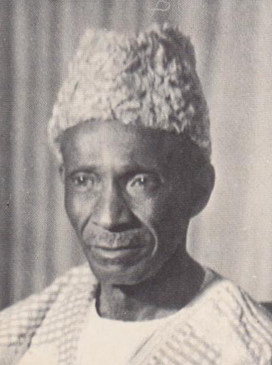
Sir Milton Augustus Strieby Margai was a Sierra Leonean physician and politician who served as the country's head of government from 1954 until his death in 1964. He was titled chief minister from 1954 to 1960, and then prime minister from 1961 onwards. Margai studied medicine in England, and upon returning to his homeland became a prominent public health campaigner. He entered politics as the founder and inaugural leader of the Sierra Leone People's Party. Margai oversaw Sierra Leone's transition to independence, which occurred in 1961. He died in office aged 68, and was succeeded as prime minister by his brother Albert. Margai enjoyed the support of Sierra Leoneans across classes, who respected his moderate style, friendly demeanor, and political savvy.
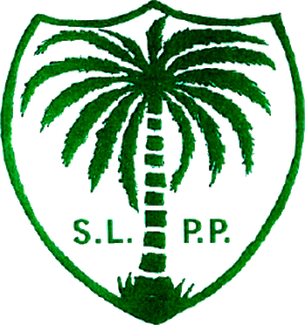
The Sierra Leone People's Party (SLPP) is one of the two major political parties in Sierra Leone, along with its main political rival the All People's Congress (APC). It has been the ruling party in Sierra Leone since 4 April 2018. The SLPP dominated Sierra Leone's politics from its foundation in 1951 to 1967, when it lost the 1967 parliamentary election to the APC, led by Siaka Stevens. Originally a centre-right, conservative party, it identifies since 2012 as a centre-left social democratic party, with a centrist tendency.

Siaka Probyn Stevens was the leader of Sierra Leone from 1967 to 1985, serving as Prime Minister from 1967 to 1971 and as President from 1971 to 1985. Stevens' leadership was often characterized by patrimonial rule and self-indulgence, consolidating power by means of corruption and exploitation.
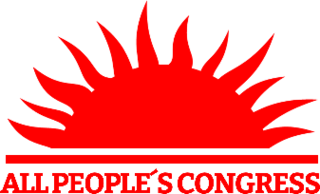
The All People's Congress (APC) is one of the two major political parties in Sierra Leone, the other being its main political rival the Sierra Leone People's Party (SLPP). The APC has been the main opposition party in Sierra Leone since 4 April 2018 when Julius Maada Bio of the SLPP won the 2018 presidential elections, though it maintains a majority in parliament.
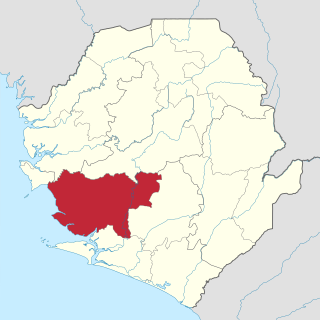
Moyamba District is a district in the Southern Province of Sierra Leone, with a population of 318,064 in the 2015 census. Its capital and largest city is Moyamba. The other major towns include Njala, Rotifunk and Shenge. The district is the largest in the Southern Province by geographical area, occupying a total area of 6,902 km2 (2,665 sq mi) and comprises fourteen chiefdoms.
The People's Movement for Democratic Change (PMDC) is a liberal party in Sierra Leone. It is a breakaway faction of the Sierra Leone People's Party (SLPP). It was officially registered on 19 January 2006. The party is led by Charles Margai, the son of Sierra Leone's second prime minister Sir Albert Margai and the nephew of Sir Milton Margai. The PMDC is based in the country's second largest city of Bo.

Ernest Bai Koroma is a Sierra Leonean politician who served as the fourth President of Sierra Leone from 17 September 2007 to 4 April 2018.
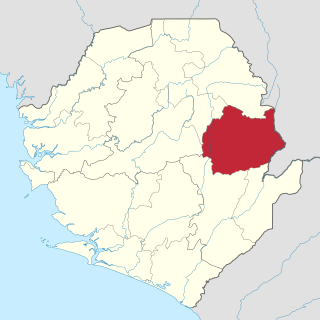
Kono District is a district in the Eastern Province of Sierra Leone. Its capital and largest city is Koidu Town. Motema is the second most populous city in the district. The other major towns in the district include Yengema, Tombodu, Jaiama Nimikor and Sewafe. The district is the largest diamond producer in Sierra Leone. The population of Kono District is 505,767. Kono District borders Kenema District to the southwest, The Republic of Guinea to the east, Koinadugu District to the northeast and Kailahun District to the southeast. Kono District is divided into fourteen chiefdoms.

General elections were held in Sierra Leone on 11 August 2007. Seven candidates competed in the first round of the presidential election; no candidate received the necessary 55% of the vote to win in the first round, and a second round was held between the top two candidates, Ernest Bai Koroma of the All People's Congress (APC) and Solomon Berewa of the Sierra Leone People's Party (SLPP), on 8 September. According to official results, Koroma won the election with 54.6% of the vote.
Momodu Koroma is a Sierra Leonean politician. He is a former Minister of Foreign Affairs and a member of the Sierra Leone Peoples Party (SLPP). He became foreign minister in May 2002, as part of a new cabinet appointed following President Ahmed Tejan Kabbah's re-election earlier in the month. Koroma had previously been Minister of Presidential Affairs. Koroma was born in the small town of Yonibana in the Tonkolili District, his father was from the Temne ethnic group, while his mother came from the Mende ethnic group. It is very rare in Sierra Leone to see inter-ethnic marriages between Sierra Leone's two largest ethnic group the Temne and Mende.

Paramount Chief Ella Koblo Gulama OBE, GCOR was a Sierra Leonean paramount chief and politician. In 1957, she became the first elected female Member of Parliament in Sierra Leone. She was re-elected in 1962. During the government of Milton Margai, Gulama became Sierra Leone and sub-Saharan Africa's first female Cabinet Minister.

General elections were held in Sierra Leone on 17 March 1967. They were won by the opposition All People's Congress, marking the first time that a ruling party had lost an election in sub-Saharan Africa. However, the APC was overthrown in a military coup hours after taking power. The party was later restored to office after a counter-coup the following year and established a long-standing dictatorship.

In April 1961, Sierra Leone became politically independent of Great Britain. It retained a parliamentary system of government and was a member of the British Commonwealth of Nations. The Sierra Leone People's Party (SLPP), led by Sir Milton Margai were victorious in the first general election under universal adult franchise in May 1962. Upon Sir Milton's death in 1964, his half-brother, Sir Albert Margai, succeeded him as Prime Minister. Sir Albert attempted to establish a one-party state had the ready cooperation of the opposition All People' Congress but met fierce resistance from some cadre within his party Sierra Leone People's Party (SLPP) and ultimately abandoned the idea.

Sierra Leone is officially a secular state, although Islam and Christianity are the two main and dominant religions in the country. The constitution of Sierra Leone provides for freedom of religion and the Sierra Leone Government generally protects it. The Sierra Leone Government is constitutionally forbidden from establishing a state religion, though Muslim and Christian prayers are usually held in the country at the beginning of major political occasions, including presidential inauguration.
Alhaji Moijueh Emmanuel Kaikai is a Sierra Leonean politician and the Sierra Leone Minister of Social Welfare, Gender and Children's Affairs since 2013. He had previously served as the resident Minister of the Southern Province, and Deputy Minister of Labour.

Sierra Leone is home to about sixteen ethnic groups, each with its own language. In Sierra Leone, membership of an ethnic group often overlaps with a shared religious identity.

General elections were held in Sierra Leone on 7 March 2018 to elect the President, Parliament and local councils. Incumbent President Ernest Bai Koroma did not run for another term, as he was constitutionally ineligible, having served the maximum ten years in office.
Apha Saidu Bangura is a Sierra Leonean social media political commentator and political analyst who is currently a member of the communication unit at the Sierra Leone Ministry of Information and Communication. He regularly releases audio on WhatsApp and videos on YouTube about the latest major Sierra Leonean political news and other major incidents in Sierra Leone. Alpha Saidu is well known in the Sierra Leonean community in the United States and the Sierra Leonean community in Europe. Alpha Saidu is also well known across Sierra Leone.